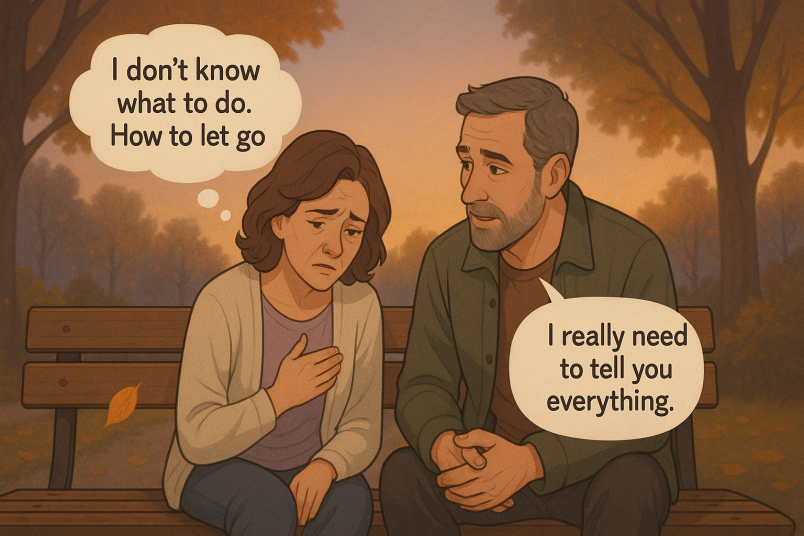What Are the 4 Types of Forgiveness in Relationships?

Heal & Grow Daily for a Happier Relationship
Subscribe FREEKey Takeaways
Marriage.com AI Quick Summary
Forgiveness in relationships can feel like a winding path—sometimes simple, sometimes overwhelming… and often deeply personal. When hurt feelings build up, love can seem fragile; yet, with compassion and understanding, hearts find ways to heal.
Each moment of reconciliation carries its own flavor, its own rhythm—like a gentle reminder that we’re all imperfect, but still worthy of grace. The different Types of Forgiveness show us that healing isn’t one-size-fits-all; instead, it unfolds in layers of patience, trust, and renewal.
And while it isn’t always easy, forgiveness often becomes the quiet bridge that helps two souls walk forward together.
What is forgiveness in a relationship?
Forgiveness in a relationship is the act of letting go of resentment, anger, or the desire for revenge when a partner causes hurt, whether intentionally or unintentionally. It’s about choosing compassion over holding grudges, allowing the bond to repair and grow stronger rather than remain stuck in conflict.
According to Christiana Njoku, LPC:
Couples need to make a conscious effort to keep forgiveness readily available, even before an offence is committed. By so doing, it becomes easier to forgive.
A research paper published in 2011 states that the tendency to forgive a romantic partner boosts relationship satisfaction by encouraging more effort in the relationship and reducing negative conflict.
For example: if one partner forgets an anniversary, the other may feel disappointed. Instead of holding onto that hurt, expressing the feelings openly, and then forgiving allows the couple to reconnect, reinforcing love over bitterness. This is where understanding the different types of Forgiveness becomes helpful.
Please note:
And remember—choosing to forgive doesn’t mean the pain didn’t matter. It means you value peace, healing, and connection enough to move forward together, step by step, at your own pace.
Forgiveness vs forgetfulness: What’s the difference
Forgiveness and forgetfulness may sound alike, but they carry very different meanings. Forgiveness is an active choice to release pain and rebuild trust, while forgetfulness is simply the fading of memory. In relationships, real healing happens through forgiveness, not by ignoring the past.
Exploring the types of forgiveness and moving through the stages of forgiveness can help couples strengthen emotional bonds.
| Aspect | Forgiveness | Forgetfulness |
|---|---|---|
| Definition | Choosing to let go of the hurt and move on | Just not remembering what happened |
| Emotional Impact | Brings peace and helps you feel lighter | Feelings may still linger underneath |
| Relationship Role | Helps rebuild trust and closeness | Can skip over issues without fixing them |
| Accountability | Says, “I was hurt, but I’m choosing to heal” | Pretends nothing really happened |
| Growth Potential | Makes the bond stronger and more understanding | Doesn’t always lead to learning or growth |
Please note:
It’s okay if forgiveness takes time—you don’t have to rush the process. Healing is not about forgetting; it’s about choosing peace for yourself and creating space for love to grow again.
What are the 4 types of forgiveness in a relationship
Forgiveness in love isn’t always simple—it comes in different forms, each with its own purpose. From letting go of small hurts to healing deeper wounds, the types of forgiveness in a relationship show us how couples can move forward with understanding, trust, and renewed connection.
1. Unconditional forgiveness
When you give unconditional forgiveness, you stop acting and thinking based on what others did or said. While you can’t automatically forget what they did, your subsequent actions won’t be founded on their actions after they hurt you. You don’t attach any condition or clause to the forgiveness in a relationship.
- How it works: In unreserved forgiveness, you give the person a second chance to prove themselves as the loyal or better person you used to know. It is now up to the person to prove you wrong or right.
- Purpose: Unconditional forgiveness is a means to mend a broken relationship and rebuild it. Although forgiveness without any conditions can be difficult, it is the best relief for the individuals concerned.
- What it reflects: When rebuilding the relationship, you focus on creating a better relationship with the person without referencing their flaws
- Example: After a heated argument, one partner chooses to let go completely—without demanding constant apologies or reminders—and focuses on reconnecting through small acts of love and trust.
2. Conditional forgiveness
When it comes to forgiveness in a relationship, conditional forgiveness is the opposite of unconditional forgiveness. You forgive the person, but remain cautious—protecting yourself so you don’t end up in the same situation again.
- How it works: In conditional forgiveness, you follow the saying, “Once bitten, twice shy.” While you may see your partner as worthy of change and a second chance, you carefully observe their future actions to decide if trust can be fully restored.
- Purpose: Conditional forgiveness serves as a way to protect yourself from being hurt again. It allows forgiveness without ignoring the need for self-preservation.
- What it reflects: This type of forgiveness often arises in situations of betrayal or infidelity. It can feel like placing your partner on “probation,” where you hold the power to either continue the relationship or walk away.
- Example: After discovering an act of dishonesty, one partner forgives but makes it clear that trust must be rebuilt gradually, keeping an eye on consistency before fully letting their guard down.
3. Dismissive forgiveness
Out of all the types of forgiveness, dismissive forgiveness is considered the lowest form. You don’t hold grudges or resentment against the person, but you also have no desire to rebuild the relationship. You choose to ignore and move on with your life in a positive way—but not within the relationship.
- How it works: Dismissive forgiveness creates distance by reducing the closeness you once shared. It may involve ending a relationship with a partner or leaving a job with a difficult boss. There is no hatred, but also no effort to rebuild.
- Purpose: This form of forgiveness is not about revenge or reconciliation—it’s about protecting yourself from future hurt. You conserve your time and energy by refusing to invest in repairing the bond.
- What it reflects: Instead of seeking closeness again, you set clear boundaries so the other person no longer has the opportunity to hurt you.
- Example: After repeated conflicts, one partner decides to forgive but also chooses to leave the relationship, moving forward peacefully while ensuring distance and boundaries remain intact.
4. Grace forgiveness
In grace forgiveness, you don’t believe you hold the power to forgive and move on in the relationship. This form of forgiveness is often seen in spiritually inclined people, who view forgiveness as something only God can grant.
- How it works: Grace forgiveness doesn’t require you to take action. Instead, it places the responsibility on the offender to seek forgiveness by making efforts to become a better person.
- Purpose: The heart of grace forgiveness is selflessness—you may not personally offer reconciliation, but you still want the other person to find peace of mind for their actions.
- What it reflects: This type of forgiveness reflects the belief that true absolution comes from a higher power rather than from the individual who was hurt.
- Example: After being wronged, someone prays for their partner to find forgiveness from God and peace within themselves, even if they don’t actively rebuild the relationship.
5 reasons why forgiveness matters in a relationship
Forgiveness is not just about saying “it’s okay” and moving on—it’s about healing, trust, and growth. In relationships, it plays a powerful role in helping partners reconnect, reduce emotional stress, and build a foundation that can last.
A research paper published in the APA Monitors CE Corner states that forgiveness is linked to better mental health—reducing anxiety, depression, and psychiatric risks—and also bringing physical benefits like fewer symptoms and lower mortality.
1. Rebuilds trust
When hurt happens, trust often takes the hardest hit. Forgiveness allows couples to slowly rebuild that trust by choosing to give each other another chance. It doesn’t mean forgetting the pain, but rather acknowledging it and then working toward a healthier bond where both partners feel secure again.
- Example: After a broken promise, one partner openly admits the mistake and makes consistent efforts to follow through in the future, showing they can be trusted again.
2. Reduces emotional stress
Holding on to resentment or anger often weighs heavily on mental and physical health. Choosing to forgive helps release that tension, giving you peace of mind and emotional freedom. In relationships, this relief translates to calmer communication and less conflict, creating an environment where love feels lighter and more joyful.
- Example: Instead of replaying a heated argument in their mind, one partner forgives and lets go, which helps them feel more at ease and present in daily life.
3. Strengthens emotional connection
True intimacy depends on vulnerability—and forgiveness makes space for it. When couples forgive each other, they acknowledge flaws and imperfections but still choose to stay connected. This strengthens emotional intimacy, showing both partners that love can survive misunderstandings and that their bond is deeper than temporary mistakes.
- Example: After forgetting an important event, one partner feels guilty, but the other forgives and reassures them with affection, reinforcing closeness rather than distance.
4. Encourages growth and change
By forgiving, you give your partner the opportunity to learn from mistakes and become better. Instead of punishing them endlessly, forgiveness creates space for accountability and personal growth. This not only strengthens your partner but also helps the relationship evolve into something more mature, resilient, and enduring over time.
- Example: After being called out for hurtful words, a partner receives forgiveness but also learns to communicate with more care, improving the relationship dynamic.
5. Makes love last
Every long-term relationship will face challenges, but forgiveness is what keeps couples together through them. By forgiving, partners choose love over pride and healing over grudges. This doesn’t mean tolerating harmful behavior—it means choosing to move forward when the relationship is worth fighting for.
- Example: Despite many ups and downs, a couple regularly chooses to forgive one another, helping their bond last through years of struggles and joys.
6 stages of forgiveness in a relationship
It isn’t enough to say, “I forgive you.” Of course, anyone can say that, but the true power of forgiveness can only be harnessed when you go through all the stages of forgiveness. Learn about the stages of forgiveness in the following paragraphs:
1. Acknowledge
This means recognizing the hurt and pain as they are. Who hurt you, why, and how long? Only once you know the details of what requires forgiveness can you consider moving into the next steps.
- How to start: Write down what happened, how it made you feel, and when it occurred—naming the hurt makes it easier to face.
Christiana Njoku highlights that:
If there’s no offence, there will be no need for forgiveness.
2. Consider
Now assess the hurt or pain. How do you feel? Think about this person, your relationship with them, and their actions. This stage is essential before you forgive and move on in a relationship.
- How to start: Spend quiet time reflecting or journaling about your emotions—anger, sadness, disappointment—and what impact the hurt has on your bond.
3. Accept
Understand that you change the past. Your anger or resentment will only cause you more pain than the other person. This is also where you decide if you want to forgive and move on in a relationship or not.
- How to start: Remind yourself with affirmations like, “I can’t undo what happened, but I can choose how I respond.”
4. Decide
At this stage, you determine whether to forgive or not. It is only after this that you can understand the types of forgiveness.
- How to start: Have an honest conversation with your partner about boundaries, expectations, and how you both want to move forward.
5. Repair
At this stage, you need to rebuild the relationship with your partner. Out of all the states of forgiveness, this is the most tasking. It is the beginning of forgiveness in a relationship. It means relearning and unlearning everything you know about the person.
- How to start: Have an honest conversation with your partner about boundaries, expectations, and how you both want to move forward.
6. Forgive
Now you need to let go of the anger, resentment, and hatred. While you don’t forget your partner’s actions, you no longer see them as the enemy but as a person who makes mistakes. Forgiveness in a relationship is accessible only after ticking all the other stages.
- How to start: Practice empathy—remind yourself that your partner, like everyone, is imperfect and capable of mistakes, but also capable of change.
How to give forgiveness in a relationship: 5 ways
Forgiveness is rarely easy, yet it’s one of the most powerful gifts you can offer in love. It’s not about excusing hurtful behavior but about freeing yourself from resentment and opening space for healing.
Whether you’re navigating the types of forgiveness or moving through the stages of forgiveness, learning how to actually practice it can make all the difference in rebuilding trust and connection.
1. See the positive side
While you are analyzing the thoughts, one of the things you have to remember is the positive side of the person. Remember the times they were truthful or helpful in the past.
- Think: What lessons have you learned? What have you learned about yourself or the other person?
- Example: After a partner forgets an important date, instead of focusing only on the disappointment, you recall the countless times they’ve shown up lovingly in daily life.
2. Put yourself in their shoes
We have all committed mistakes in the past and will do so in the future. Perhaps, they were struggling with some personal issues. It is vital to empathize with your offender and understand from their perspective.
- Think: Imagine you are the person who hurt you. Why would you have acted that way? What was going through your mind the whole time, and how would you feel at that moment, knowing you just betrayed someone?
- Example: A partner lashes out in frustration, and instead of labeling them as cruel, you consider the overwhelming pressure they’ve been under at work.
3. Talk to someone
In the case of cheating or someone going behind your back to damage your reputation, it might be hard to forgive. If you are in this situation, it is best to talk to a close friend, relative, or professional who handles relationship issues. They may offer you the proper support and advice.
- Think: Who in your life can truly listen without judgment? Is there a counselor, mentor, or loved one who can help you process your feelings and guide you forward?
- Example: After learning about a partner’s betrayal, you confide in a close friend who not only comforts you but also helps you see the bigger picture and your options.
4. Express your feelings calmly
Bottling up emotions often makes forgiveness harder. Sharing your feelings openly and calmly with your partner can help clear misunderstandings and create a space for healing. It’s not about accusing but about being honest with how their actions affected you.
- Think: How can I explain my feelings without blaming? What do I need my partner to understand about the hurt I experienced?
- Example: Instead of shouting, you say, “I felt really hurt when you kept this from me, and I need honesty if we want to move forward.”
Watch this TED Talk by Peder Tellefsdal, a communications advisor, who shares how small acts of responsibility help earn forgiveness when relationships hang in the balance.
5. Set healthy boundaries
Forgiveness doesn’t mean allowing repeated hurt. Setting clear boundaries ensures you protect your emotional well-being while still giving the relationship a chance to grow. Boundaries show that forgiveness is paired with self-respect and expectations for change.
- Think: What behaviors will I no longer accept? What limits will help me feel safe in this relationship again?
- Example: After forgiving a partner for dishonesty, you set the boundary that you expect full transparency about finances moving forward.
FAQ
Forgiveness in relationships often brings up questions because it touches both the heart and mind. Here are some quick answers to common doubts couples have about practicing forgiveness.
-
Can you truly forgive without forgetting?
Yes. Forgiveness means letting go of resentment, while forgetting is losing memory of the hurt. You can forgive and still remember, using the experience to set healthier boundaries.
-
How long does it take to forgive someone?
There’s no fixed timeline. It depends on the depth of the hurt, your readiness, and your partner’s actions. For some, it takes weeks; for others, forgiveness may take years.
-
Does forgiveness mean staying in the relationship?
Not always. Forgiveness heals your heart, but staying together depends on trust, respect, and willingness to rebuild. Sometimes, forgiving and moving on separately is the healthiest choice.
The healing power of forgiveness
Forgiveness in a relationship is more than a kind gesture—it’s an act of courage and love. It allows couples to release resentment, rebuild trust, and grow closer despite imperfections.
While the process can be challenging, moving through the stages of forgiveness offers a path to deeper understanding and stronger bonds. It doesn’t mean excusing hurtful actions, but choosing peace over pain.
Ultimately, forgiveness heals not only the relationship but also the individuals within it, creating space for lasting love and emotional freedom.
Stuck in conflict and unsure how to move forward together?
 Tips
Tips
Write your tip or submit a video tip
All tips are reviewed before the publishing.
Share this article on
Recent Articles
Related Quizzes
Heal & Grow Daily for a Happier, Healthier Relationship
Subscribe FREE on YouTube We'd love your feedback!
We'd love your feedback!
 Expert Q&A
Expert Q&A
Ask your question related to this topic & get the support you deserve from experts.





















 Thanks for your feedback!
Thanks for your feedback!